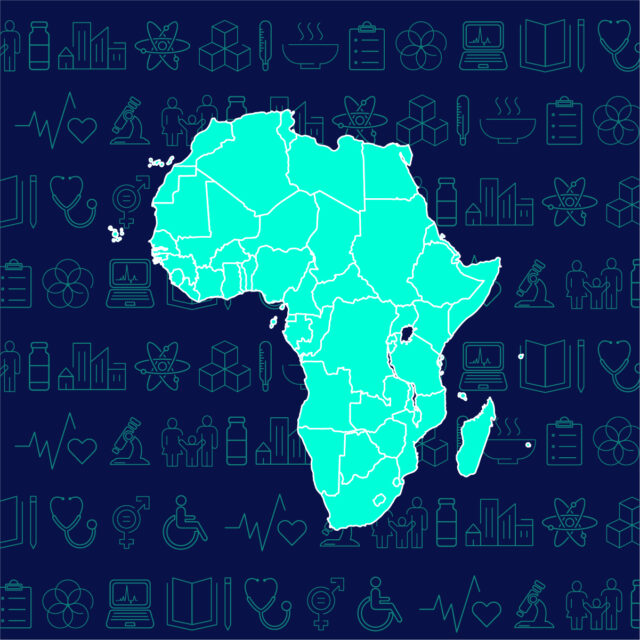February 14, 2022 marks the two-year anniversary of the first case of COVID-19 in Africa. Despite the several pandemic-related lockdowns and economically disruptive restrictions that have been imposed across Africa to stop the spread of the virus, we are still nowhere close to ending the pandemic.
What’s even more alarming is the number of healthcare workers who have been immigrating. Around 1,000 workers move to the United States each month from African countries, the Philippines, and the Caribbean. In Africa, this is impacting the sheer number of healthcare workers available to help fight the pandemic. The CDC in Africa has called for a plan to strengthen the healthcare system throughout the continent with a focus on enticing healthcare workers in the diaspora to return home and help fight COVID-19.
With all this in mind, it is important to reflect on the impact of the coronavirus in Africa so as to inspire us to keep on raising our voices to call on all governments to work together and make this the year we end the pandemic once and for all.
Here’s a closer look at how that progress is going.
COVID’s impact on physical and mental health
In some African countries like Malawi and South Africa, where a majority of the population has already contracted COVID-19, the pandemic is said to have reached a near-endemic stage in which the virus becomes a more predictable bug similar to a common cold or the flu. The Omicron variant has had the least devastating impact in these countries because of immunity gained through prior infections.
In South Africa, it is reported that there is “high population immunity” against COVID-19. This optimistic turn in the pandemic has led to an easing of restrictions that have triggered a surge in manufacturing. But this doesn’t mean that the pandemic is near over. Until everyone, regardless of where they live, has fair access to COVID-19 vaccines, the pandemic will continue to impact people’s lives and livelihoods.
And in Ghana, the pandemic has impacted more than just physical health. In Ghana it has caused a mental health crisis which is pushing the available services to a breaking point. The mental health care necessary to cope with everyday life is out of reach for the average Ghanian. A lot of awareness has been raised around the economic challenges brought on by the pandemic, but the crisis in Ghana clearly illustrates how it has also taken its toll on the wellbeing of people beyond issues of livelihood.
COVID’s impact on healthcare services
The pandemic is also causing other disruptions to vital health services, including access to contraceptives and family planning services.
In Nigeria, prior to the pandemic, 83.4% of women were not using any method of contraception, according to a report released by the Nigerian National Bureau of Statistics last year. And as a result of the pandemic, unintended pregnancies increased during the lockdown period. But despite that, the pandemic did help boost public reception of the self-care programmes created by the government to address this issue. The number of women now accessing self-administered contraceptives has doubled over the past year in areas like Niger State where over 80,000 women have since taken up the prescribed self-injection method.
Finally, in Kenya, several healthcare workers dependent on national health insurance were almost left without any protection against the virus following the government’s failure to provide them with adequate protective equipment, testing, or other safety measures. The healthcare system is under such heavy strain that workers have gone on strike across the country because of their frustration with stagnant wages, and a prolonged delay for their promotions. Despite the civil unrest and issues facing healthcare workers and systems, there is hope. Vaccine access in rural areas across the country has become possible thanks to innovations such as the Vaccibox, a solar-powered refrigerator invented by Kenyan engineer Norah Magero. This invention will help plug the cold-chain storage gap across the country, which is crucial to expanding vaccine access.
How vaccine inequity is impacting Africa
Ensuring everyone has access to vaccines is crucial to ending the pandemic once and for all. But in Africa, vaccine inequity is impacting this progress and in turn, impacting lives and livelihoods across the continent. Only 25.9 vaccines have been administered for every 100th person in Africa, compared to 160.7 in Europe.
Despite advocacy work being carried out to encourage manufacturers to share vaccine recipes with developing countries, some African countries are taking vaccine production into their own hands to make strides towards ending the pandemic. Morocco is building a second vaccine manufacturing facility and hopes to produce 20 million doses by the end of the year to boost vaccination rates across the country.
We’re two years into this pandemic and the state of most African economies is a stark reminder that it is still far from over. There is still much to be done in the journey towards making COVID history. If we continue to stand together in solidarity and use our collective voice to hold governments accountable for ending the pandemic, then hopefully there won’t be a third anniversary.

